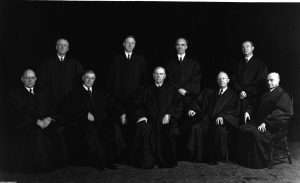The Volokh Conspiracy
Mostly law professors | Sometimes contrarian | Often libertarian | Always independent
Today in Supreme Court History: October 29, 1942
10/29/1942: Published decision in Ex Parte Quirin released. At that point, six of the saboteurs had already been electrocuted.

Editor's Note: We invite comments and request that they be civil and on-topic. We do not moderate or assume any responsibility for comments, which are owned by the readers who post them. Comments do not represent the views of Reason.com or Reason Foundation. We reserve the right to delete any comment for any reason at any time. Comments may only be edited within 5 minutes of posting. Report abuses.
Please to post comments


Shell v. Mississippi, 498 U.S. 1 (decided October 29, 1990): capital murder conviction reversed because definition of “especially heinous, atrocious or cruel” given to jury was too vague
Alexander v. Holmes County Board of Education, 396 U.S. 19 (decided October 29, 1969): Court attempts to end “all deliberate speed” stalling by declaring that as of now any segregated school system is per se illegal
New York v. Eno, 155 U.S. 89 (decided October 29, 1894): federal courts can’t spring someone from state jail until state appeals process on federal question has run its course
Re “heinous” etc. I think it was Lord Denning of generally blessed memory who, faced with a statute using the phrase “unusual depravity”, said that it meant, “more than usual depravity”. 🙂
I note that Denning, like Prof Volokh, was originally a mathematician – though not a prodigy.
Still no.
If you're going to let the President execute POWs without due process, at least define some kind of sensible definition of a POW. (E.g. a definition that does not hinge on the person having violated the laws of war.)
This also seems dubious, as a statement of the laws and usages of war at the time, and definitely as a statement of the law today:
Someone is a civilian or a belligerent. There is no third flavour. A civilian accused of a crime is tried in civilian courts, a belligerent might be tried in some other way. But both civilians and belligerents have due process rights.
See, for example, art. 45-67 of the 1929 Geneva Conventions: https://ihl-databases.icrc.org/assets/treaties/305-IHL-GC-1929-2-EN.pdf
For example:
Military tribunals can be sufficient due process.
The saboteurs in Quirin were belligerents. A POW is a lawful belligerent. These people were unlawful belligerents. Lawful belligerents have to be treated as POWs, they can be imprisoned for the course of the war but can’t be punished. But this just isn’t the case with unlawful belligerents.
This is all very standard. Remember Nathan Hale? Spies were tried summarily by military tribunal and executed in the revolutionary war, and in every war since.
Constitutionally enemy combatants aren’t entitled to any process. They can simply be shot on sight. The laws of war and protections afforded lawful belligerents, and are entirely creatures of treaty, statute, and military/international common law, not the constitution. If it wants to, Congress could pass a statute tomorrow repudiating and repealing them all.
“Constitutionally enemy combatants aren’t entitled to any process. They can simply be shot on sight.”
This is far from clear especially if it involves an American citizen off the battlefield, who is unarmed, and who submits to authority.
Due process applies to “persons.” The terms are left open-ended. The Constitution also contains an overall understanding of the basic rules of what a government can do.
This includes some minimal standards, especially per current understandings of the legitimate treatment of any human being.
Anyway, I assumed the original comment wasn't stating what was possible if Congress decided to waive all the rules but what the law was and should be ("if you").
"If it wants to, Congress could pass a statute tomorrow repudiating and repealing them all."
You know that the 'treaty, statute, and military/international common law' that the US has agreed to is for the protection of OUR personnel, not others, right?
I never said I thought it would be good policy to do so. Just that it could. The source of law is Congress rather than the Constitution. And what Congress has done, however firmly entrenched and however wise and good a policy it may be, it can potentially undo.
The saboteurs were not summarily electrocuted, to be clear, but the level of due process [including an ability to appeal to the Supreme Court] is clearly open to question.
The Court at War: FDR, His Justices, and the World They Made by Cliff Sloan covered this and many other topics. Recommended.
10/29/21: a few cases were granted cert including Arizona v. City and County of San Francisco. The case was later dismissed as improvidentially granted (DIG). The case involved the “public charge” regulation of the Department of Homeland Security.
Roberts for Thomas, Alito, and Gorsuch concurred in a brief opinion, agreeing the “mare’s nest” of issues involved warrants it. Nonetheless, he noted the actions of the new Administration to change the rule in place might have been too summarily done given the rules of agency procedure.
They were not only "Spies" but "Saboteurs" and Nazi's to boot, got what they deserved.
https://www.cnn.com/2024/10/29/politics/pennsylvania-overseas-ballots-ruling/index.html
Why does every single one of these cases end up before a black Obama or Biden judge? Who is cheating on the judicial assignment process?
They don't.
They absolutely do. How did Chutkan get the D.C. case? It's one after another.
That's but one instance. How did Cannon get the Florida case? And think of all those post-2020 election cases when a significant number were heard - and rejected - by Republican judges?
Teh ignorantz
Because SDFL West Palm division only has a few judges.
What about Brett H.Ludwig, the Trump-appointed federal district judge who decided the Wisconsin election case against Trump?